
Likecoin驗證人之一,旅日工作中 主頁在這,歡迎來訪->https://thumbb13555.pixnet.net/blog
Code Farmer's Daily - Lesson 2 of "Ama Workshop": Learn to Stake Validators and Understand LikeCoin Community and BigDipper
The second lesson of the 2022 Arma Workshop begins!
Following the content of the previous workshop - understanding the world of LikeCoin, let's discuss the cryptocurrency like LikeCoin in more depth and lead you to understand the world of cryptocurrency from the perspective of LikeCoin
In this class, our team wants you to understand the following goals:
- Get an overview of cryptocurrencies
- Explain the meaning of words we use frequently in the world of cryptocurrencies
- Talking about what I think the impact of cryptocurrencies on the world situation
- Learn to use BigDipper to query data
- Learn to Stake Validators with LikerLand
An overview of cryptocurrencies - clarifying the differences between cryptocurrencies and virtual currencies

How much do you know about cryptocurrencies?
Why some "coins" can be cryptocurrencies and some cannot be regarded as cryptocurrencies? Why is "cryptocurrency" a "cryptocurrency"? Why does "coin" have to be "encrypted" (oh my god, what a twist)
These things, I am afraid that no one has said, most people still have to find a lot of information to understand it.
In fact, according to Dr. Lansky Jan's article " Possible State Approaches to Cryptocurrencies. Journal of Systems Integration " , he explained that a cryptocurrency must meet the following conditions to be a cryptocurrency
- The system does not need to be a central institution, and the state (price) can be maintained through consensus among holders
- The system can record ownership
- The system needs to be able to generate new cryptocurrencies and define the source of new coins
- The currency must be cryptographically proven
- There is transaction behavior in the system
- Two identical commands are not allowed at the same time
In fact, if we use a relatively simple statement, that is, cryptocurrencies must have all the behaviors in the financial system, such as "transaction", "anti-counterfeiting", "minting", "recording", etc., in order to qualify as a cryptocurrency
In this regard, I like to compare online game currencies to cryptocurrencies. By the way, do you think the currency system of traditional online games can be called cryptocurrency?
.
.
The answer is: no !
The reason is also very simple, because it has no special anti-counterfeiting function, nor an open accounting system, and cannot record the token conversion between holders, so it cannot be called a cryptocurrency
Ps, but in fact, many online games in recent years have also used cryptocurrencies as their game tokens~
And I also clarified a concept with you in class, that is, " Virtual currency = cryptocurrency? "
My answer to this question is:
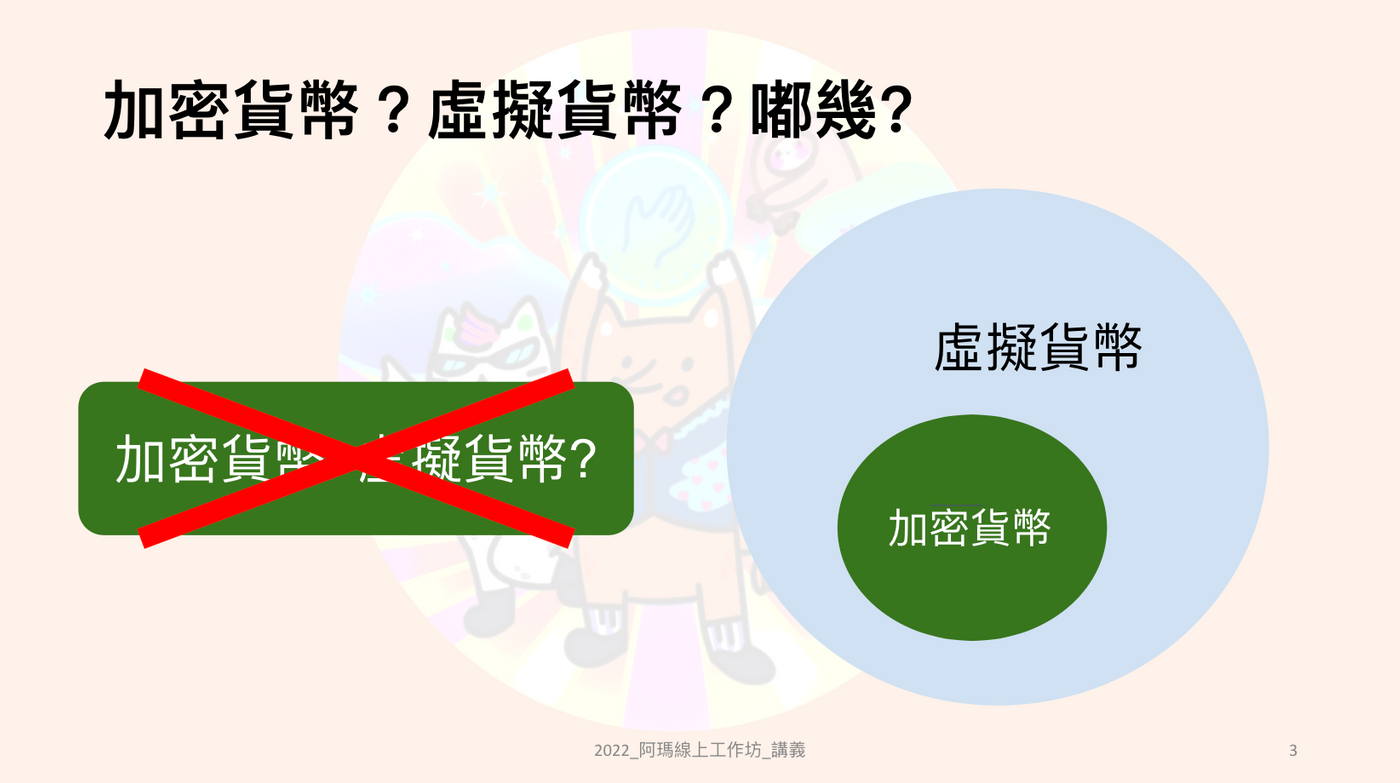
Yes, in English, virtual currency is virtual currency in English; and cryptocurrency is cryptocurrency in English. Among them, currency means " currency, currency ", and crypto means " cryptography "
So generally speaking, when we talk about virtual currency, we can actually include cryptocurrencies, but in theory, we cannot equate cryptocurrencies with virtual currencies.
Emmm.... However, I still talk about virtual currency (laughs), anyway, it's good to have a correct understanding.
Cryptocurrency = scam?

If you introduce cryptocurrencies to others, half of 10 people think it's a scam, right?
Well, maybe your group won't XD
However, it is undeniable that in this day and age, if you talk about virtual currency with a person who does not understand at all, some people will probably preconceived that cryptocurrency is a scam, and will in turn advise you to get out of the sea of misery as soon as possible, and don’t be deceived ( shoot
In fact, this is not without reason. Because in terms of cryptocurrency, its value is based on "consensus"? What's the meaning? Let's go back to Dr. Lansky Jan's definition of cryptocurrency above
The system does not need to be a central institution, and the state (price) can be maintained through consensus among holders
That is to say, cryptocurrency is built on the mechanism that you, me, and him feel that there is that value , so this thing has value; and not only that, this thing is not regulated by any authority, so it is so "uncontrolled" things that are hard enough for ordinary people to trust
Ps I just watched Lao Gao's video, and he talked about the weakness of human nature to obey power unconsciously, and in fact, human beings have the mentality of hoping that "high and respectable" people will decide for you. But unfortunately, in the world of cryptocurrencies, there is no XD
Therefore, even if the financial system of fiat currency in reality is moved to the online world, because this world is not controlled by the Financial Control Commission, many people do not trust it. I think...that's pretty scientifically explainable (wry smile)
glossary
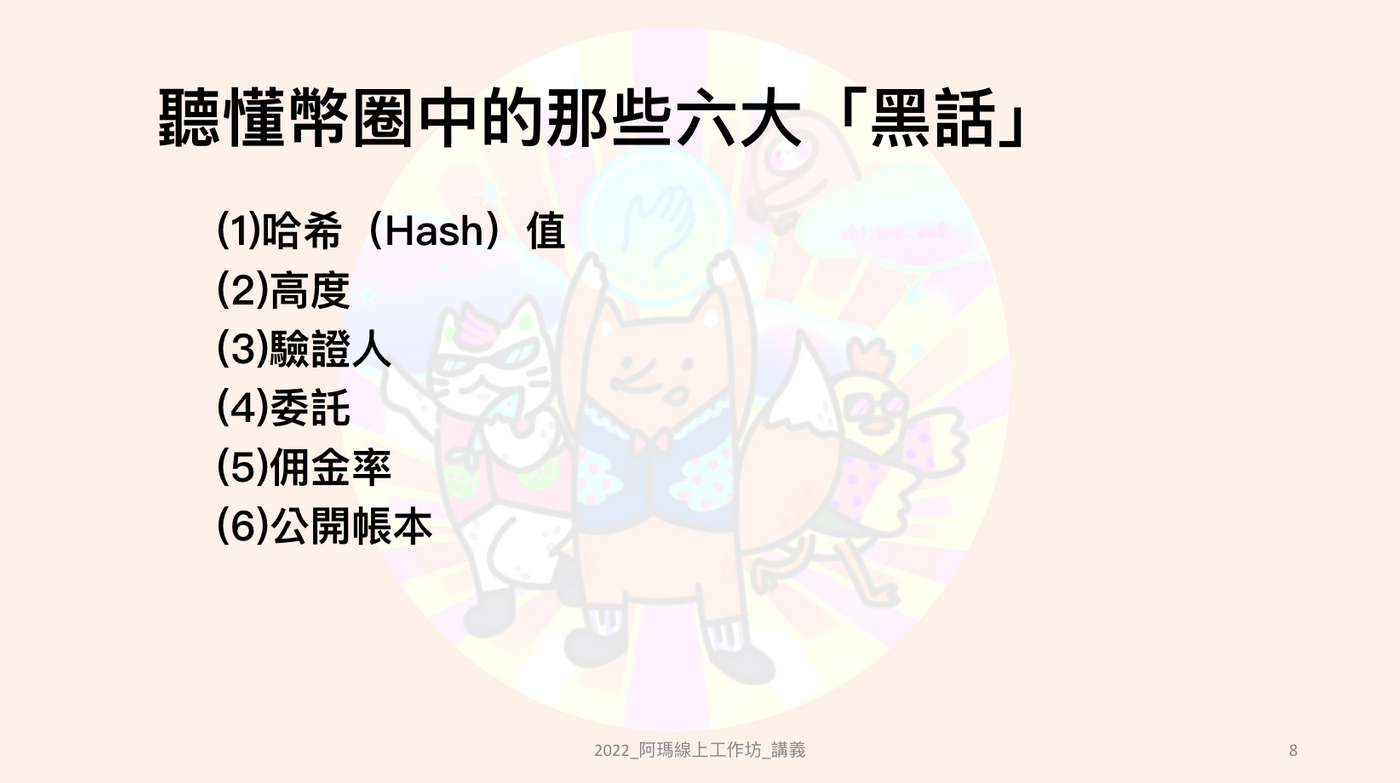
In the next unit, we explain some of the vocabulary we often talk about in the cryptocurrency world
And I sorted out these words. Although I may not use these words to talk to you if I am right again, these words will always be widely used when you read other articles in the future. So I'm going to talk a little bit about the meaning of these words here.
Hash value
Hash value, also known as hash code . It is an encryption method of cryptography. The encryption method of encrypted currency is SHA-256 encryption, which is one of the most widely used and relatively secure compression algorithms in the world. Through this encryption method, the probability of collision between wallets or transmissions is 1/2¹²⁸ (to give you a concept, The odds are good enough for you to hit the Lotto jackpot three times in a row)
But in fact, most people don't need to know so much. In fact, they only need to know that everything on the blockchain is encrypted through such an encryption method to ensure that your money will not be lost.
high
Simply put, it means how much data is transmitted by the chain. Basically, all our transfer behaviors will stack up a height for the blockchain.
SF
Basically oh... the validator is a human, but it's actually a machine XD
For the validator, how can you understand it? Basically, if the entire blockchain is like playing a game of jiejie, then the verifier is a group of people who are responsible for checking whether the bricks are of good quality (laughs)
Delegate (or pledge) Stake
From an investment perspective, validators are like opening a bank. The act of putting money with him is called a delegated stake. (Your money is still your money, but staked to the validator to get interest). When delegating, the delegator will also get some rewards; usually it is calculated as an annualized return (APR) to the delegator. Know that the APR of each validator will be slightly different.
And delegation, what are the benefits? Where is the risk?

What I said in class was basically from an investment perspective. The delegation actually has the function of stabilizing the currency price. After all, the pledged coins must wait for 21 days before the delegation can be released, so if everyone pledged in it, it can prevent the situation of being "sold in large quantities" to a certain extent. Therefore, some more professional sayings will say: "Pledge has the function of protecting the network"
Commission Rate and APR
What is the commission rate? Basically, it can be understood as a unit of how much interest you can get when you stake on a validator
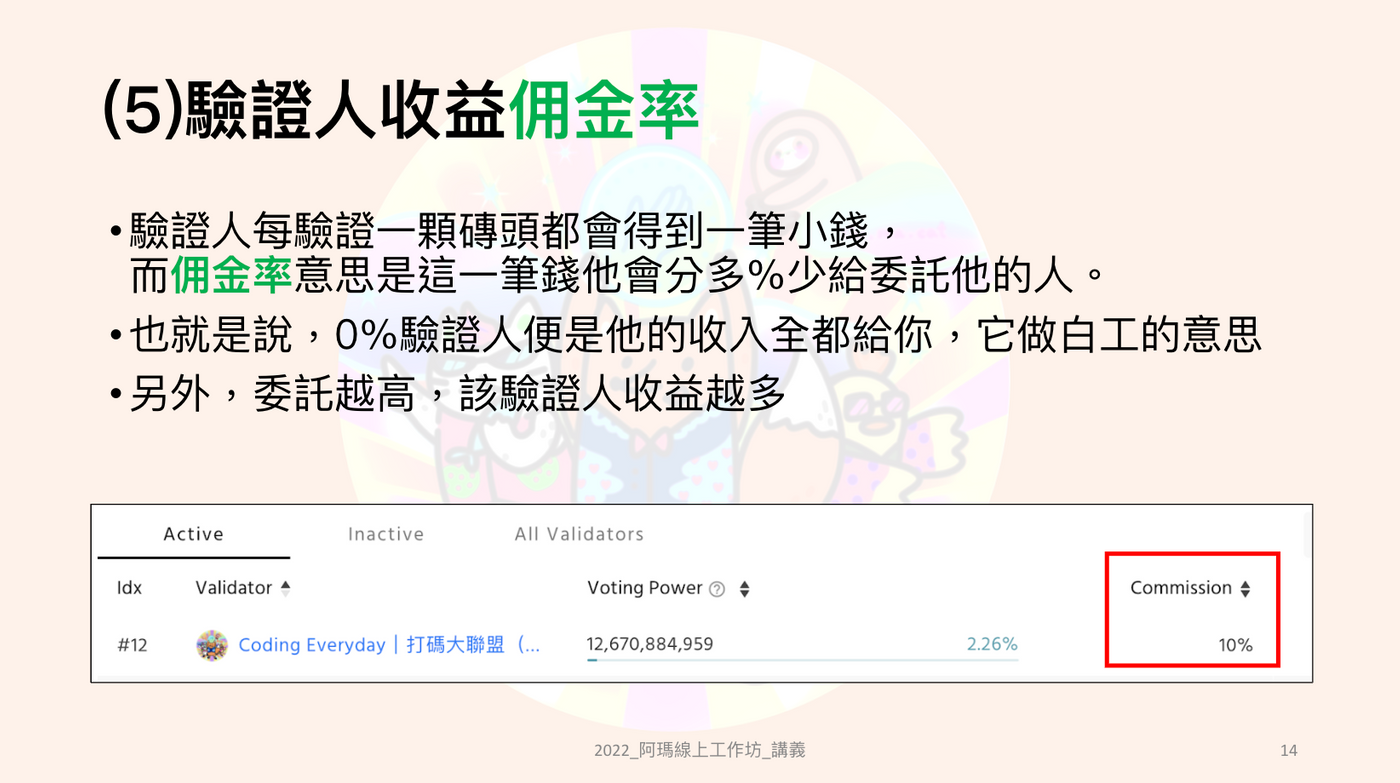
The commission rate is set by the validator himself. Some validators may need to have money to maintain expenses because of the operation of certain projects, so he will increase the commission rate a little bit. And in my case, I think the 10% commission rate is actually enough for me to run workshops or other operations, so I basically just stay at 10% with no changes.
Some people may ask, the display method of stake.like.co is APR (annualized income), and BigDipper is the commission rate (Commission), so what is the relationship between the two?
Basically after me asking around, I got this formula
Annualized Revenue = Inflation*(LikeCoin in Staking/Supply)*(1-commission)
English version: APR = Inflation*(bonded/supply)*(1-commission)
The above values can be found on BigDipper
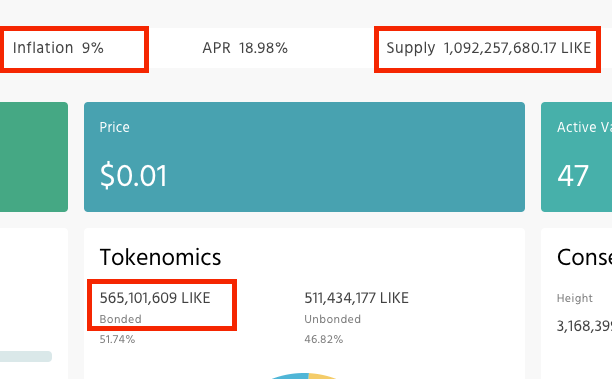
Of course, everyone will help you calculate the APR, so... XD
However, the entrusted APR is as high as 18.98%! Oh my god, it's so profitable, isn't it? So what are their risks?

Basically, most of the above two are related to the validator itself. In addition to the ability to lazily laugh , the validator itself must also have the ability to maintain node survival in essence.
If the above two occur, sometimes it does not mean that his technical skills are not strong enough ( in fact, I have been questioned about technical skills, and I have been criticized for a while ), but may not be technically proficient in operating nodes or Accidentally, or if something really happens, it will drop the line or double sign
So for stakers. Before you pledge a validator, you may be able to observe how well he interacts with everyone, or his technical skills and other factors to consider, and then choose a validator you like!
public ledger
In fact, it's not too difficult. The website that the public account book specifically presents is actually the BigDipper website XD
Talking about what I think the impact of cryptocurrencies on the world situation
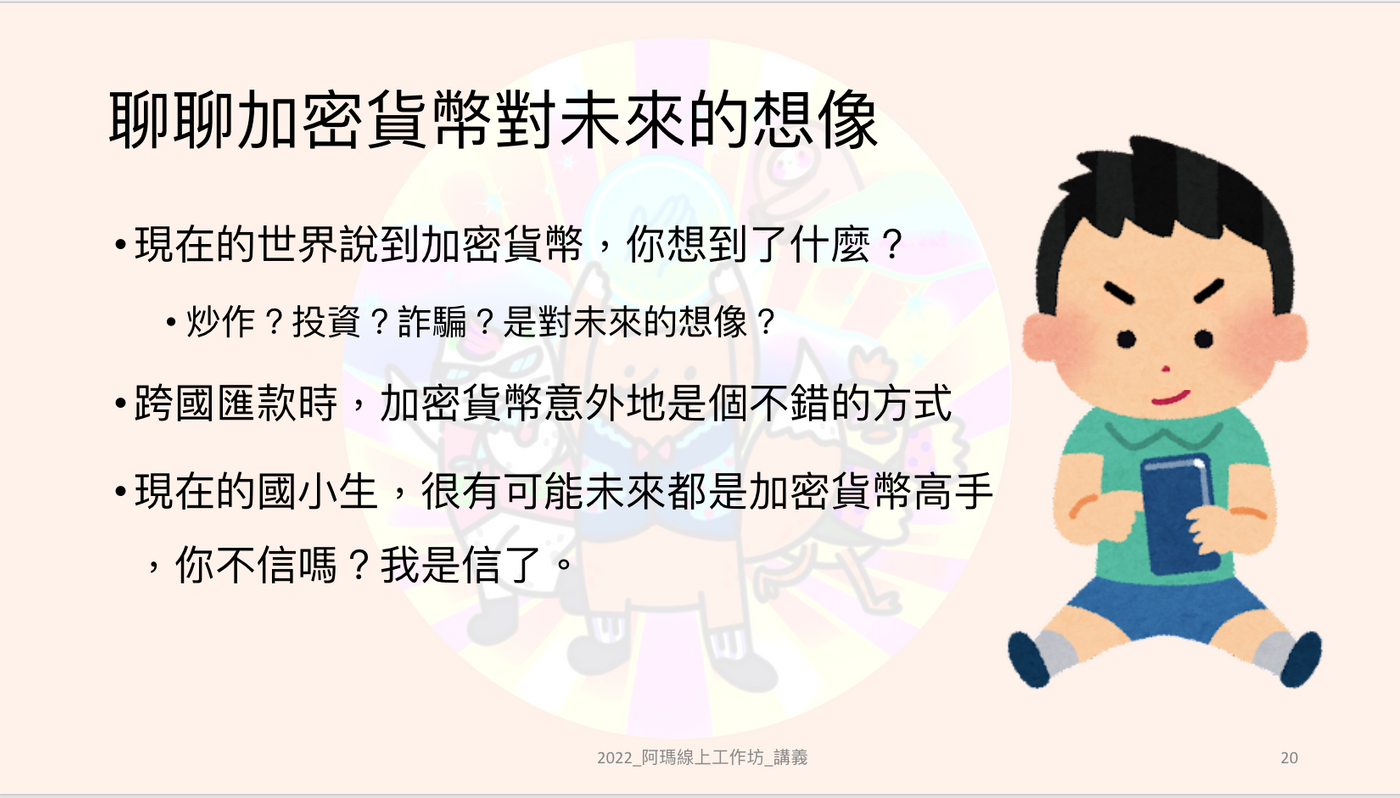
In 1969, the network system as we now know it was born.
Now in 2022, even the elderly are more or less swiping their mobile phones and asking relatives and friends for pictures of the elders.
Around 2010, I should be in elementary school. At that time, my family sent me on a study tour, and I went to the United States to live for a week. At that time, Mama gave me a calling card for international calls. I was very impressed. After breakfast in a restaurant in the United States, I used the Zhang Ka called my mother on the public phone
In addition to confirming safety on the phone, he also mentioned " Okay, the phone bill is very expensive, let's talk about the rest. "
That's right. Even though my country is small, I know that "international phone calls are expensive." But what about now? Just open a Line and you can make video calls. Even if I don’t have a Line app, I can open a Google meet. You don’t have to wait in line for a public phone, you don’t have to bring a card, and you don’t have to call 007.
What about the future? Do you have any experience in international money transfer?
I remember that when I went to Japan before, the seniors in the same group had no money for a while; I also went to the ATM in the convenience store to withdraw Japanese currency directly from Taiwan dollars to the seniors and they needed urgently. As a result, the handling fee... It hurts to see (sigh
But what about cryptocurrencies? In fact, we don't have to care about the nationality of the other party when remittances with cryptocurrencies. Just like the recent Ukraine-Russian war, Ukraine opened a cryptocurrency donation account. As a result, everyone can donate money directly to Ukraine without going through cumbersome procedures.
What about the future? Will the cross-border remittance of cryptocurrencies be more convenient and easy to use? This part is just waiting for the moment when cryptocurrencies enter the people's homes in the future!
Implementation: Staking validators with Liker Land
Delegate validator
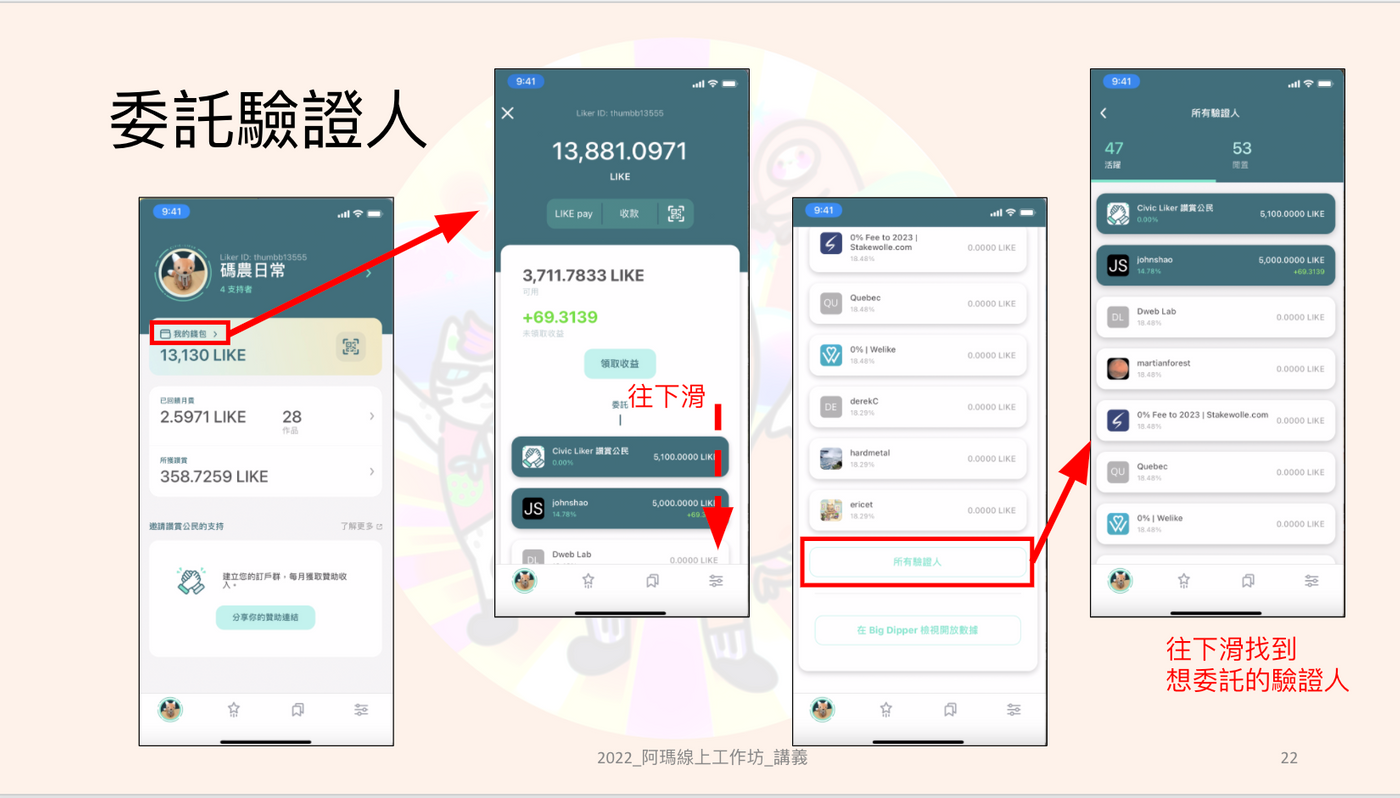
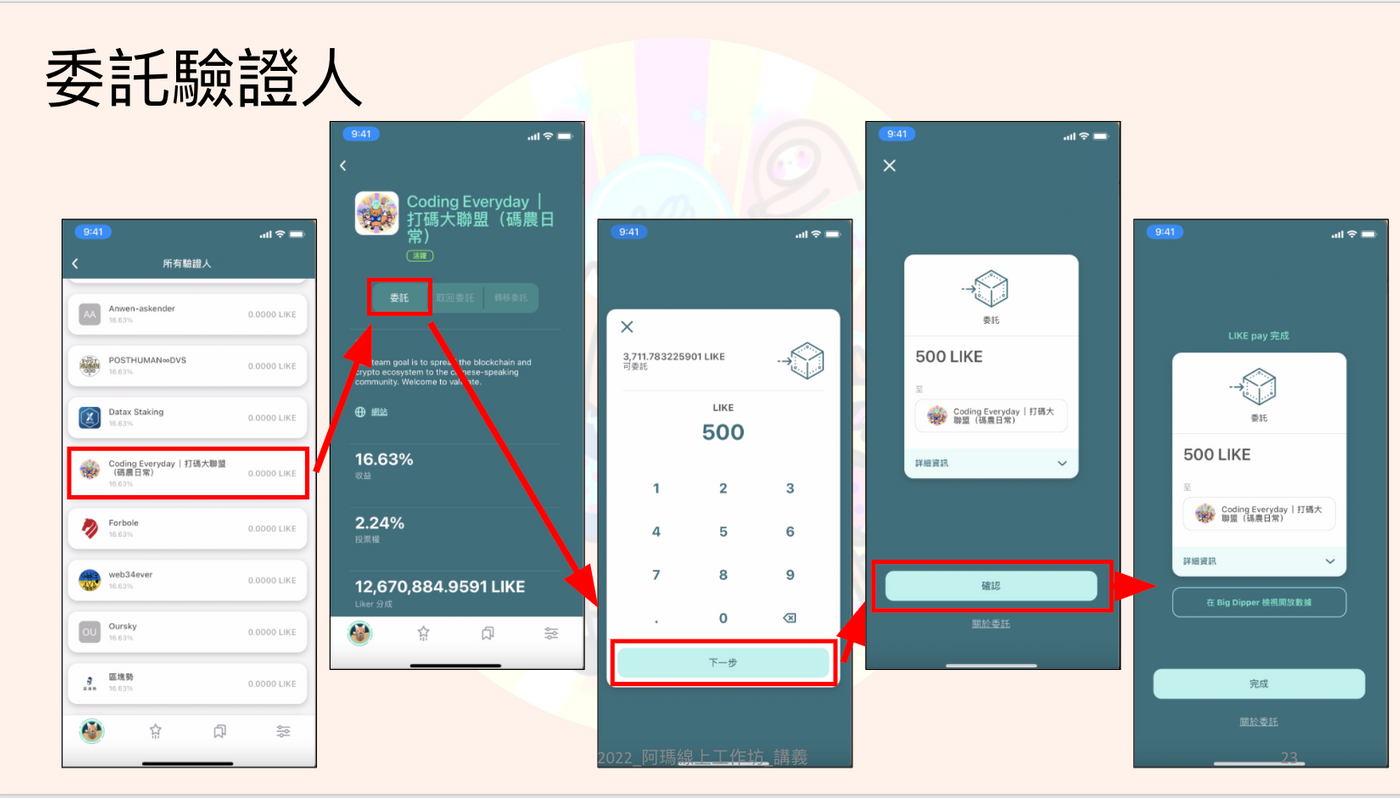
Sub-delegation
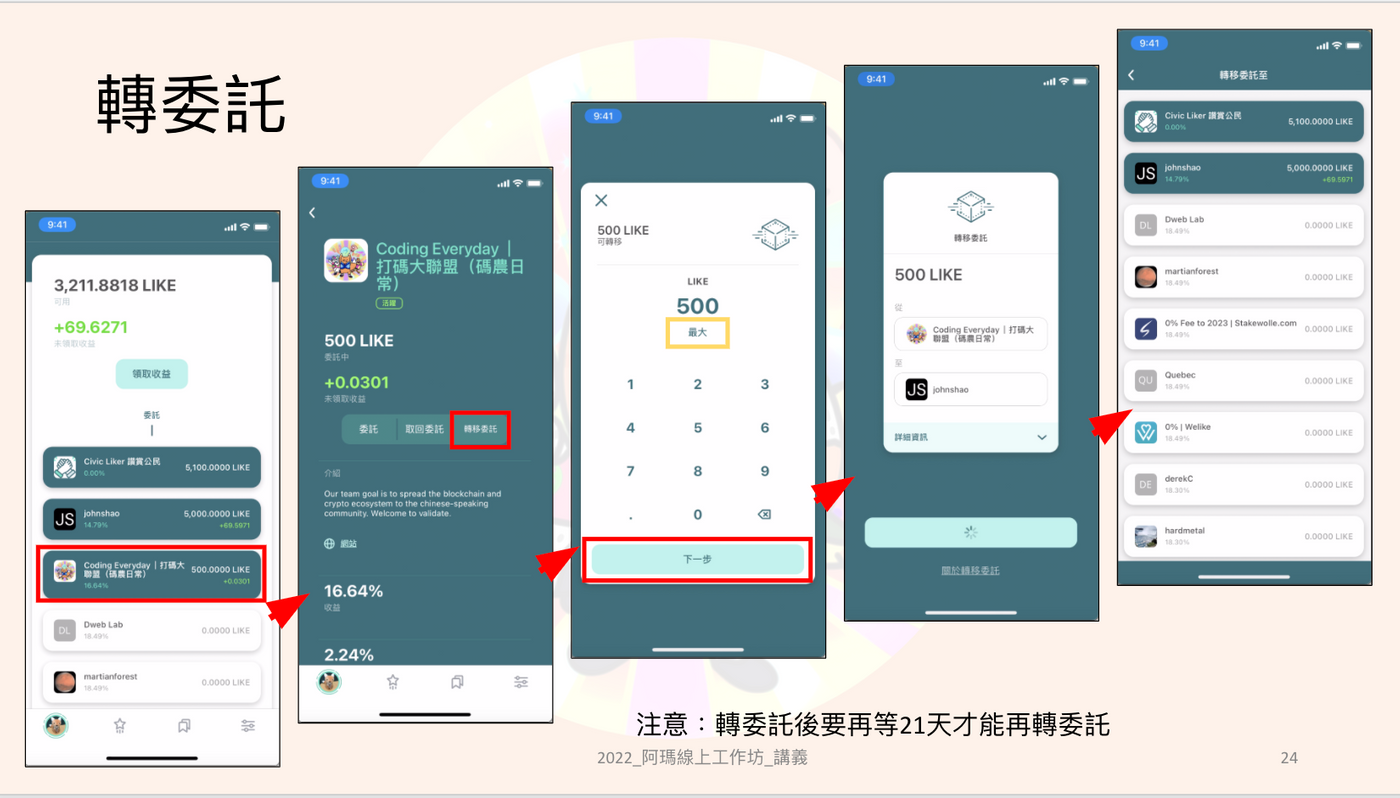
Delegate
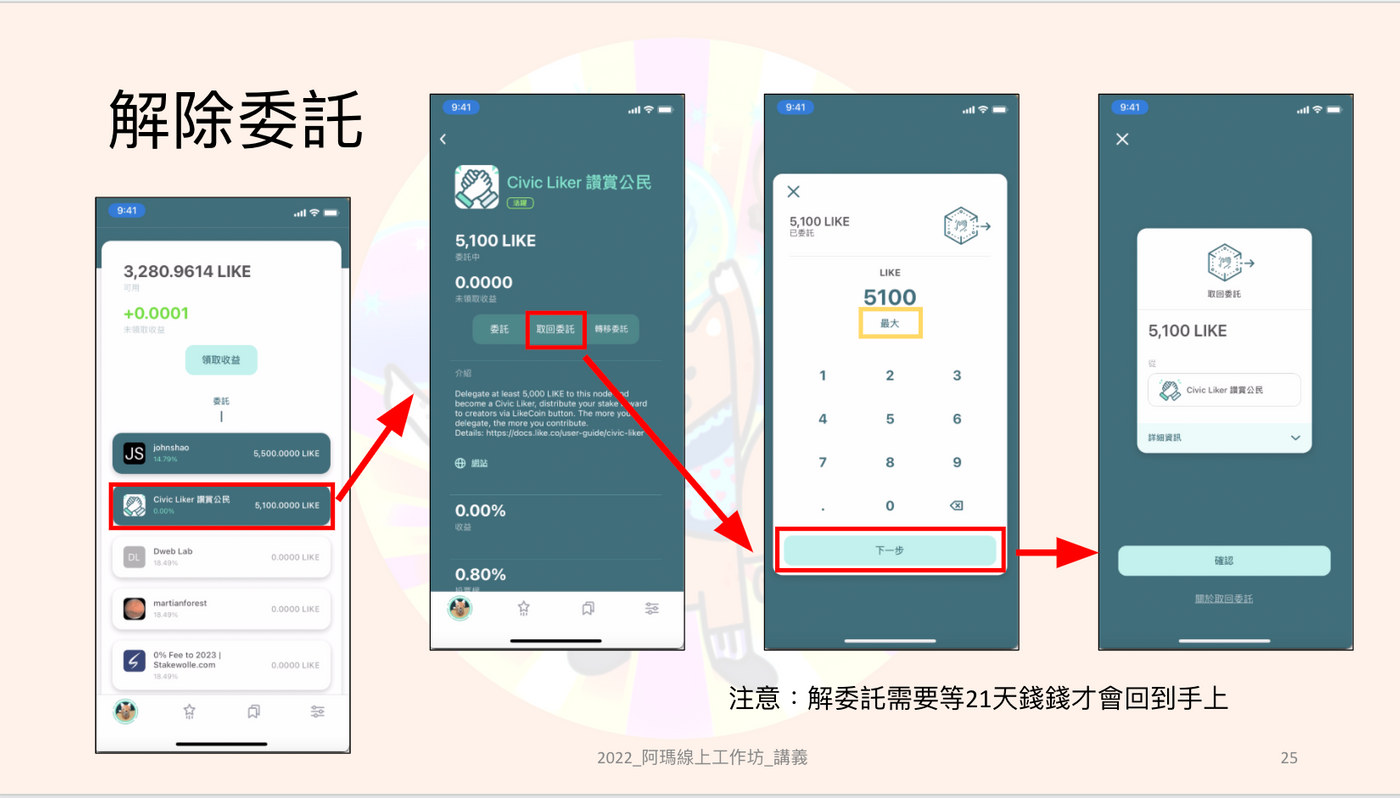
Note: After delegating, you need to wait 21 days before the money will be returned to your hands!
Implementation: Learn to use BigDipper
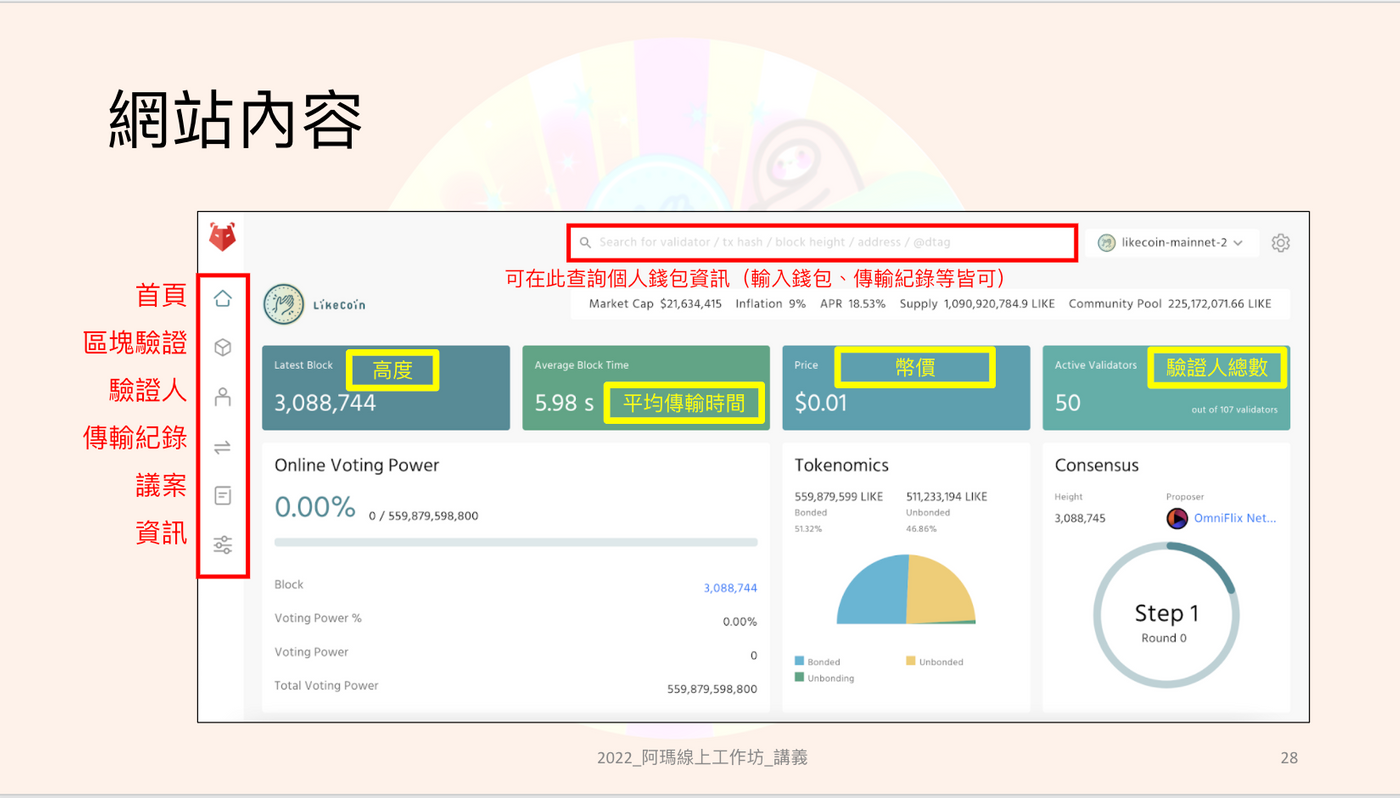
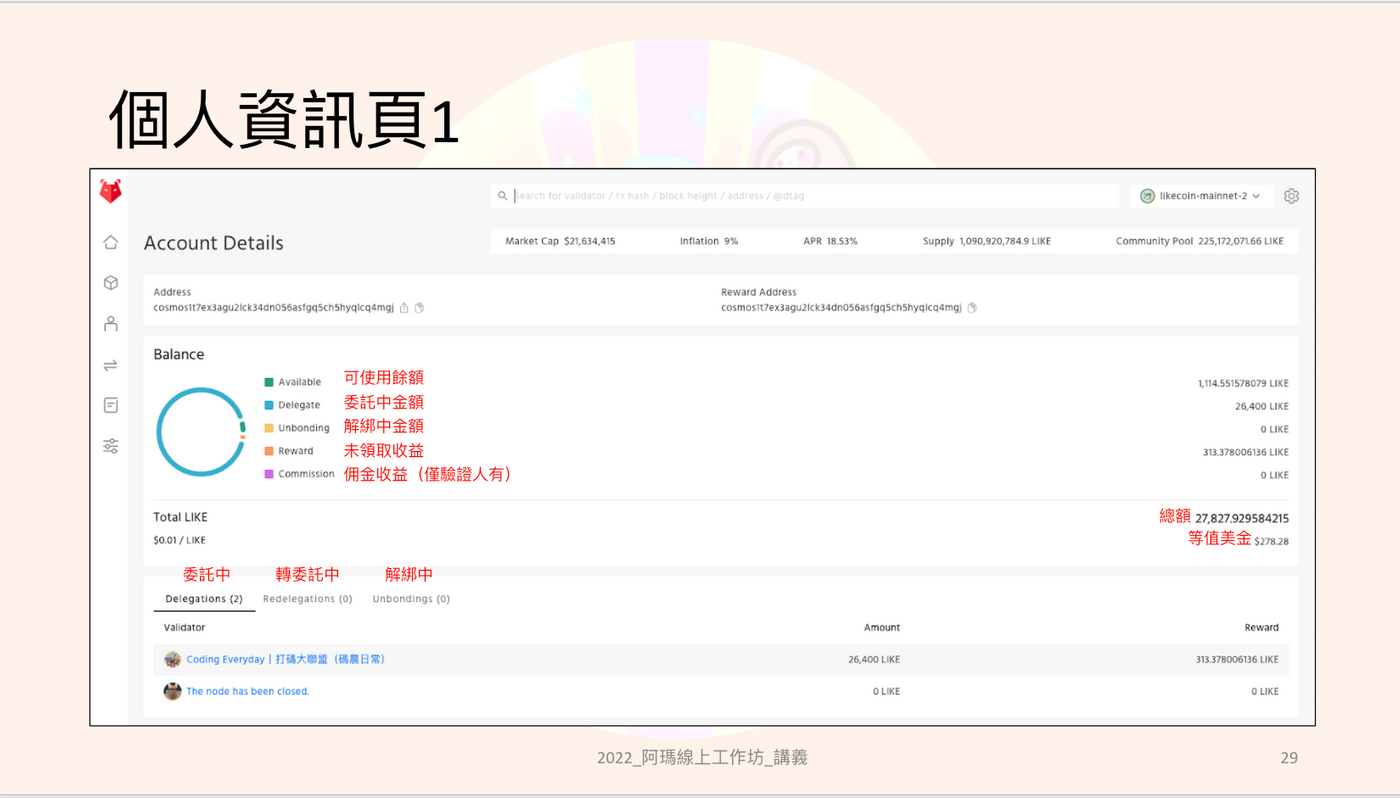
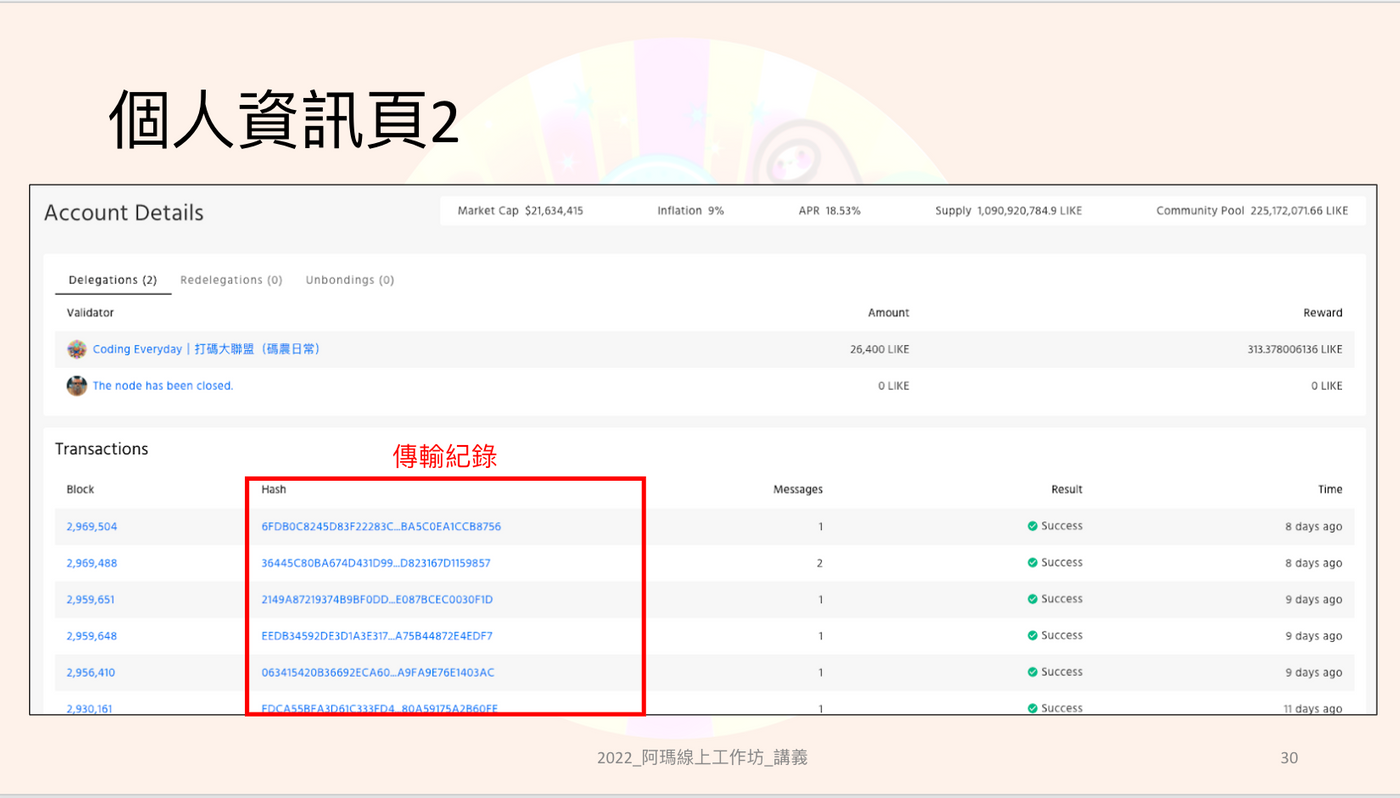
postscript
Following the previous content, this time we will take you back to the world of cryptocurrencies from a more "technical" perspective. Next, we will teach you how to open a Keplr wallet and use Keplr to do everything Liker Land can do
In addition, due to space reasons, this church did not teach you another part about pledge - the part of voting
In the world of blockchain, we always have some things that need to be decided by everyone; and how should these things be decided? How is it decided? After deciding what to do, etc., these will be covered in the next lesson
Finally, the next class is on 4/9 (Saturday) 20:30 (GMT+8). In addition, the course video and ppt files are sent to all students who come to the class. Similarly, those who subscribe to my fireplace enjoy The ppt is permanently linked to the video (in the public chat area) , and you are welcome to subscribe to the Fireside Dry Talk Association and the Institute of Black Technology
signature file
Hello, code farmer here, I am a furnace operator/verifier of a bunch of nodes/technical blogger/Ama online workshop lecturer/composer . If you think my work is good and want to support me, you can entrust some Virtual coins to my validator machine. The following is my information
Around the Hearth: Dry Talk Association and Black Technology Research Institute
Online course tag: #amaonlineworkshop
Liker Social -> https://liker.social/web/accounts/106276839374927423
Ruffian State -> Code Farmer's daily affairs
Appreciate the civic subscription link -> https://liker.land/thumbb13555/civic
LikeCoin Validator Machine -> Big League
Chihuahua validator machine -> coding big league
BitSong validator machine -> coding big league
BitCanna Validator Machine -> Code Big League
Music Creation -> Aki Studio
(It's getting longer and longer and adding more....)
Like my work?
Don't forget to support or like, so I know you are with me..

幹話協會暨黑科技研究所

打碼不用多,能跑則行;幹話不用多,有幹則名 本圍爐立志成為馬特市第一幹話與迷因愛好協會 歡迎來我這裡一起互噴垃圾話、分享迷因、商議馬特市經營之道!
Comment…